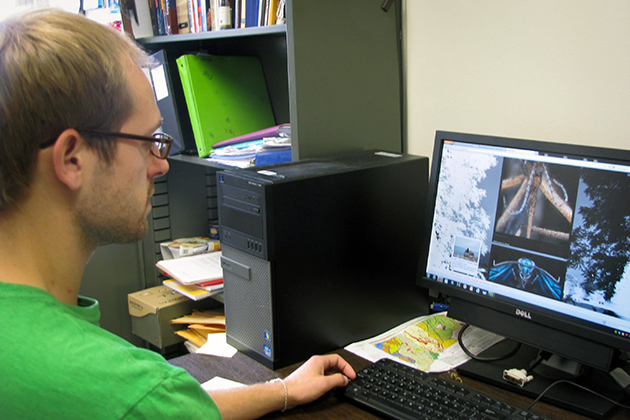
The words ‘scientist’ and ‘entrepreneur’ may not evoke the same mental image, but in the case of Mark Smith, they are a perfect fit.
Smith, who will finish his Master of Science degree in geoscience later this summer, is the winner of this year’s Innovation Quest competition which recognizes aspiring UConn student entrepreneurs with monetary awards as well as providing support through an ongoing training program known as inQubator.
For Smith, who earned the $15,000 first-place award in a competition that drew more than 100 entries, getting kudos for his proposal to form a hi-tech start-up company called Macropod Imaging Solutions was vindication of his hard work and determination.

The company, which has already generated considerable interest, will produce an imaging device that is not only lower in cost than currently available technologies, but is also portable. Smith’s prototype offers a means of capturing ultra-high-resolution images of micro-macroscopic objects in both two and three dimensions. Unlike existing devices, his version moves lightweight objects relative to the optic device, rather than the inverse. This helps eliminate the possibility of vibrations that could potentially corrupt the photos and produces finished images that are completely in focus.
Another aspect of his prototype that sets it apart from others is that it will incorporate a state-of-the-art method for geo-referencing tiny objects in geographic information systems such as Google Earth or ARC GIS. Smith’s next generation prototype will be entirely automated and will get the user from start to finish in seconds, so high resolution images can be rapidly captured and uploaded to a global geographic database. This has important implications for scientists taking the hardware into remote field locations.



Smith’s interest in this technology dates to his high school years in Stewartstown, Pa. A neighbor, Tony Gutierrez, is chief molecular biologist at the U.S. Army Institute of Public Health at the Aberdeen Proving Ground in Maryland. Gutierrez developed the initial Macropod system, now trademarked by the U.S. Army, and inspired his young neighbor to continue enhancing the technique so that it could have wider application.
Following graduation from Indiana University of Pennsylvania, where he earned a bachelor’s degree in geology, Smith began graduate work at UConn in the Center for Integrative Geosciences, in the College of Liberal Arts and Sciences. His work involves interpreting structural and seismological features that are preserved within the rocks of eastern Connecticut.
“I study the processes that led to the opening of the Atlantic Ocean, as well as something known as post-rift inversion,” he says. “This is defined as a period of compression following extension during rifting – a rift is a broad linear zone where the Earth’s crust is being pulled apart.”
During his research, Smith found evidence for up to four different ‘plate tectonic’ states of stress in eastern Connecticut. This region encompasses the town of Moodus where those who live in the vicinity are used to odd noises and rumblings – called ‘Moodus Noises’ – that are caused by tiny earthquakes in the area.
His advisor Jean Crespi, associate professor of geosciences, says that his work will help elucidate whether compression in a region where the Earth’s tectonic plates are moving apart is caused by a sudden burst of volcanic activity when the floor of a new ocean basin starts to form.
“Although Mark may claim to be an entrepreneur, he is at his core a structural geologist,” she says. “And so he, like the rest of us [in this field], is ultimately most at home thinking about geometry and all sorts of spatial problems related to rock deformation.
“At first glance Mark’s imaging device may seem far removed from his geology training,” Crespi adds, “but I suspect that his spatial thinking skills have been key to his development of creative solutions to the problem of imaging small objects.”
With Smith’s interest in geology, a career as a petroleum geologist is a possibility. In fact, he was recruited this spring to attend ExxonMobil’s Geoscience Guadalupe Mountains Field Course, a prestigious invitation for a budding geologist. Unfortunately, the dates of the course conflicted with Innovation Quest’s presentations, and as a finalist Smith chose to forego the trip, though he may be invited to attend another field course in the summer.
Winning the Innovation Quest competition, along with a $10,000 innovation voucher awarded to him by CT Next; another $10,000 top prize won on May 2 at the Central Connecticut State University Business Plan and Incubation Competition; and several other smaller awards, has put Smith in the enviable position of having the option of pursuing any one of a number of career paths.
As he considers various possibilities, he says, “I really just need to be smart [in my decision making], and that means taking advantage of the opportunities in front of me. I’ve met a lot of great people in my undergraduate and graduate programs, and I would love to go into business with some of them. I believe that being an entrepreneur includes being part of a team.”

In his spare time, Smith can sometimes be found riding his orange, single-speed mountain bike over the rocky trails in nearby parks. While others may prefer a more cushioned ride on bikes with fancy suspension systems and multiple gears, he likes the more rugged ride he gets on technically challenging terrain.
Whether Smith decides to pursue a career in geology, or to devote his career to developing his business, or some combination of the two, he says that being a geologist has helped him have respect for the environment, and that he will take that feeling into whatever he does in the future.
To view Smith’s work, visit MacroscopicSolutions on Facebook.


